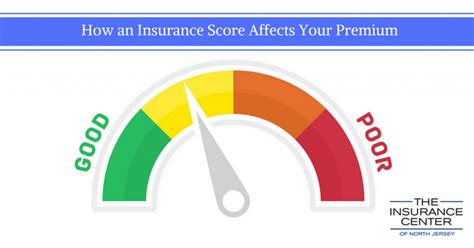What Is An Insurance Score

In the realm of insurance, understanding the intricacies of risk assessment is crucial. One such assessment tool is the insurance score, a metric that plays a pivotal role in determining insurance premiums and eligibility. This article aims to delve into the concept of insurance scores, exploring their definition, purpose, calculation methods, and real-world implications.
Understanding Insurance Scores

An insurance score, or insurance credit score, is a numerical representation of an individual's creditworthiness as it relates to insurance. It serves as a predictive tool for insurers, helping them assess the potential risk associated with insuring a particular individual or entity. This score is a key factor in the underwriting process, influencing the terms and conditions of insurance policies.
Insurance scores are primarily based on credit information, but they also consider other factors such as billing practices, collection records, and the number of credit inquiries. These scores are designed to provide a comprehensive view of an individual's financial behavior and stability, which are key indicators of their potential risk profile.
The Purpose and Significance of Insurance Scores

Insurance scores serve a critical function in the insurance industry, offering a standardized method to evaluate risk. For insurers, these scores are a valuable tool for making informed decisions about policy offerings, premiums, and coverage limits. They help insurers identify high-risk individuals or entities, allowing for more accurate pricing and risk management.
From a consumer perspective, insurance scores can significantly impact the cost and availability of insurance. Individuals with higher insurance scores may benefit from more favorable terms, such as lower premiums and broader coverage options. Conversely, those with lower scores may face challenges in obtaining insurance or may be subject to higher premiums and stricter policy conditions.
Calculation and Components of Insurance Scores
Insurance scores are calculated using a variety of credit-related data points. While the specific algorithms and weightings may vary between insurers and credit bureaus, there are several common factors that contribute to an insurance score.
Credit History
An individual's credit history is a crucial component of their insurance score. This includes the length of credit history, the types of credit accounts held, and the overall credit utilization ratio. A longer credit history with a diverse range of credit accounts and responsible utilization can positively impact an insurance score.
Payment History
Payment history is another critical factor. Insurers examine whether an individual has a history of timely payments, any delinquencies, or past-due accounts. Consistent on-time payments are generally favorable for insurance scores, while missed or late payments can significantly lower an individual's score.
Credit Inquiries
The number of credit inquiries, or hard pulls, on an individual's credit report is another consideration. Multiple credit inquiries within a short period can indicate financial instability or an increased risk of default, potentially lowering an insurance score.
Public Records
Insurance scores also take into account public records, such as bankruptcies, foreclosures, or tax liens. These events can significantly impact an individual's creditworthiness and, consequently, their insurance score.
Collection Records
Collection records, which indicate past due or defaulted debts, can negatively affect insurance scores. Insurers view individuals with a history of collections as higher risk, as it may suggest financial irresponsibility or difficulty managing debt.
The Impact of Insurance Scores on Policyholders
Insurance scores have tangible effects on policyholders. Individuals with higher insurance scores may enjoy the following benefits:
- Lower Premiums: Higher scores often result in more competitive premium rates, saving policyholders money over time.
- Broader Coverage Options: Insurers may offer a wider range of coverage plans to individuals with better scores, providing greater flexibility and protection.
- Faster Processing: Applications from individuals with higher scores may be processed more quickly, reducing the time between application and policy activation.
On the other hand, individuals with lower insurance scores may face challenges, including:
- Higher Premiums: Insurers may charge higher premiums to offset the perceived increased risk associated with lower scores.
- Limited Coverage Options: Some insurers may restrict the types of coverage available to individuals with lower scores, potentially leaving policyholders with inadequate protection.
- Application Denials: In severe cases, individuals with very low insurance scores may be denied coverage altogether.
Improving Your Insurance Score

Improving your insurance score can lead to better insurance options and lower premiums. Here are some strategies to consider:
- Maintain a Good Credit History: Ensure timely payments on all credit accounts and strive to keep your credit utilization low.
- Monitor Your Credit Report: Regularly review your credit report for errors or signs of identity theft. Disputing inaccuracies can help improve your credit score.
- Reduce Credit Inquiries: Limit the number of new credit accounts you open, as each inquiry can temporarily lower your score.
- Manage Debt Responsibly: Work towards reducing outstanding debts and avoid missing payments.
The Future of Insurance Scoring
The insurance scoring landscape is evolving, with insurers increasingly incorporating advanced analytics and data science techniques. Machine learning algorithms are being used to develop more sophisticated scoring models, taking into account a wider range of factors beyond traditional credit information.
As the industry adapts to changing consumer behaviors and emerging technologies, insurance scores are likely to become even more predictive and accurate. This evolution may lead to more personalized insurance offerings, tailored to the unique risk profiles of individual policyholders.
| Factor | Impact on Insurance Score |
|---|---|
| Credit History Length | Longer history generally improves score |
| Credit Utilization | Low utilization is favorable |
| Payment History | Timely payments increase score; late payments lower it |
| Credit Inquiries | Multiple inquiries within a short period can decrease score |
| Public Records | Bankruptcies, foreclosures, etc. can significantly lower score |

Frequently Asked Questions
Are insurance scores the same as credit scores?
+
While insurance scores and credit scores are related, they are not the same. Insurance scores are specifically designed to assess risk for insurance purposes, whereas credit scores are more general indicators of creditworthiness. However, both types of scores often share common factors, such as payment history and credit utilization.
Can I improve my insurance score quickly?
+
Improving your insurance score can take time and consistency. While there are no quick fixes, you can start by ensuring timely payments on all credit accounts and reducing your credit utilization. Regularly monitoring your credit report for inaccuracies and addressing any issues can also help.
Do all insurers use insurance scores in their underwriting process?
+
Not all insurers rely solely on insurance scores. Some may place more emphasis on other risk factors, such as occupation or driving record. However, insurance scores are a common tool used by many insurers to assess risk and determine policy terms.
Can insurance scores change over time?
+
Yes, insurance scores can change as your financial behavior and credit history evolve. Positive changes, such as consistent on-time payments and reduced debt, can lead to an improved insurance score over time. Conversely, negative changes, like missed payments or increased debt, can lower your score.
How often should I check my insurance score?
+
It’s a good practice to review your insurance score annually. This allows you to monitor any changes and take corrective actions if needed. Additionally, if you’re planning to apply for a new insurance policy, checking your score beforehand can help you understand your risk profile and potential premium costs.



